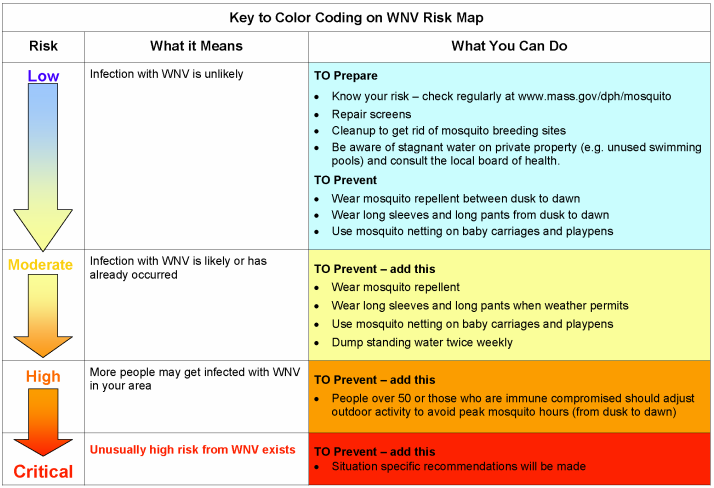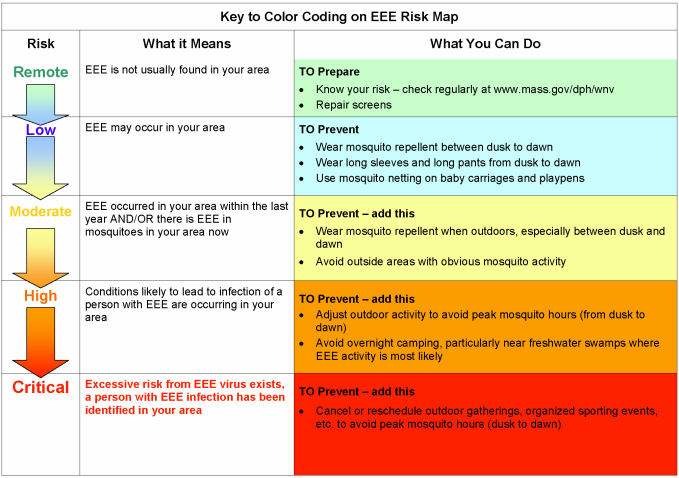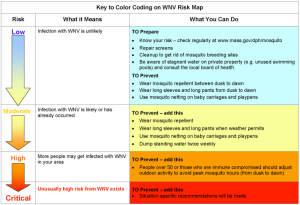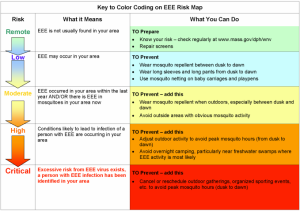While the risk for Eastern Equine Encephalitis (EEE) is currently “remote” in Newton, West Nile Virus is now rated as “high,” according to the Massachusetts arbovirus update.
Outbreaks of EEE are cyclical, with higher case counts occurring every few years depending on mosquito populations and environmental conditions.
Last week, however, Massachusetts identified its 4th case of EEE and its 11th case of West Nile Virus, a less lethal but still serious condition that “can cause illness ranging from a mild fever to more serious disease like encephalitis or meningitis,” according to the arbovirus update,which also features detailed risk maps and reporting.
Both viruses are spread to people by the bite of an infected mosquito, according to the CDC.
After several years of COVID guidelines, School Nurse Beth Escobar says that the School is well-prepared to take on mosquito-borne illnesses, including EEE.
“This is a virus that has the potential to pick up speed in the years to come,” Escobar said. “I encourage people to be aware of their surroundings and to take whatever precautions necessary to combat this little bugger. As a school, we consider many variables when determining guidelines for safe attendance at school and at sporting events.”
Most people who contract EEE show no symptoms, according to Dr. Elizabeth Christian, assistant in pediatrics in the Division of Infectious Diseases at Boston Children’s Hospital.
“But a small number of people who do get infected show symptoms,” Dr. Christian said. “And this can be anything from a mild fever with headache and joint pains. “A small percentage of people go on to have what we call a neuro-invasive disease, so the virus doesn’t just circulate throughout their blood and make them feel sick. It actually goes to their brain and causes infection of the brain.”
Additionally, Director of Health Services Beth Escobar explained the School’s stance on EEE.
“Having made it through (successfully) several years of COVID guidelines, I think we’re well-prepared to take on EEE as well. This is a virus that has the potential to pick up speed in the years to come,” Escobar said. “I encourage people to be aware of their surroundings and to take whatever precautions necessary to combat this little bugger.”
While Massachusetts have classified most cities and towns in Middlesex County, including Newton and Chestnut Hill—where the School is located—as low risk for EEE, the Upper School trip to Camp Beuercrest in Amesbury has a rating of “moderate.” This means the virus has been found in or around the area within the past year.
In August, according to The Boston Globe, Steven S. Perry, 41, of Hampstead, N.H., located about 16 miles from Amesbury, was the first fatal case of EEE in the state in a decade.
Before traveling to Bauercrest, Upper School Head Joshua Neudel listed several precautions students should take to protect themselves, including wearing bug repellent with DEET, avoiding standing water, and wearing long pants and long sleeves during dusk
Athletic Trainer Larry Stahley recognizes the risk of EEE and WNV, with bug spray being placed in the medkits.
“There’s going to be bug spray in all the medkits now, so were going to be adding that, making sure there’s bug spray in the medkits,” Stahley said. “Every athletic director in the league has talked about it [risk from mosquitos], and when that risk level gets too high or something becomes a bigger issue, games will be canceled or delayed or postponed.”
Even in areas where mosquitoes carry the EEE virus, the odds of being infected after a bite from an infected mosquito are relatively low. Moreover, only a small fraction of mosquitoes carry the virus.
However, about 30 percent of those who develop clinical EEE infection die from the disease, and many who survive suffer long-term neurological complications, according to the CDC.
“Death usually occurs 2 to 10 days after onset of symptoms but can occur much later. Of those who recover, more than half are left with physical or neurologic sequelae, which can range from mild brain dysfunction to severe intellectual impairment, personality disorders, seizures, paralysis, and cranial nerve dysfunction,” according to the CDC. “Many patients with severe sequelae require long-term care and die within a few years.”
With warm and humid weather, Massachusetts Public Health Commissioner Robbie Goldstein warns that the risk of EEE and West Nile will remain elevated.
“There will continue to be risk from mosquito-borne disease until the first hard frost, and I encourage everyone to continue to take measures to protect themselves by using mosquito repellent with an EPA-registered active ingredient when outdoors, wearing long sleeves and pants, and being aware of peak mosquito hours,” Goldstein said in a recent press release.



























































